|
And the need for containers doesn't stop with food. A closet in our basement has containers that store light bulbs, batteries, candles, and emergency supplies. Containers and bins in my basement workshop hold small items that could get lost. We even have large containers that store toys that our great-grandchildren play with when they visit. Our attic is also filled with containers. There are boxes of Christmas decorations up there that have been there since we built the house 35 years ago. As they become out-of-date, we buy new ones. But do we dump the old ones. Nooo! They may become valuable antiques some day. Put them in a container and forget about them. There are probably 4,629 containers in my wife's sewing room upstairs. I have no idea what she stores in them, and wouldn't dare open one. I'm lost in that room. I have containers in the closet in my computer room that are so rarely opened that I've forgotten what many of them contain. On the plus side our mostly useless stuff stored in containers is highly organized. The stuff is placed in the containers, and they are neatly stacked in closets, on shelves, and in the attic and basement, and they're out of the way.
I know hanging onto useless stuff doesn't make sense. But those arguments don't register on my radar screen any more. And at my age my battery is getting low, and it's too much trouble to get rid of the stuff. I recently discovered that there are containers stores that sell nothing but containers. Imagine that! I decided to go into the container business, but found that the market is already saturated. So I'm working on an invention that will eliminate the need for a zillion containers in the home.
My invention will eliminate the need for liquid products to be packaged in containers and put on shelves at the supermarket. It works like putting gas in your car. Your car has a gas tank to hold the gas, and you take your gas tank to the gas pump and fill it up. I'm going to sell supermarkets large tanks that can be installed overhead and filled with Clorox, washing powders, vinegar, Diet Pepsi, sugar, and any liquid product or product that pours. You buy one plastic bottle for each of the liquid products you use at home, take it to the market, stick it under a spout, pull the handle, and fill it up. The ounces your bottle contains will be noted at the cash register, and you'll be charged accordingly.
My invention is so amazingly simple I'm surprised that someone hasn't figured it out already. I'm seeing a patent attorney tomorrow.
|
|



